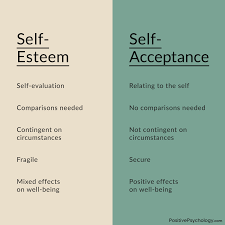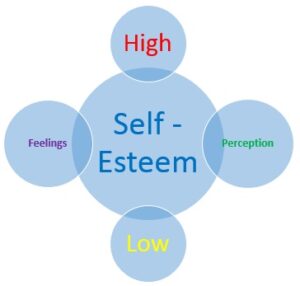
What is self-esteem?
How To Build Self-Esteem: The overall impression one has of oneself is known as self-esteem. Self-esteem that is both high and realistic is crucial for mental health Childhood experiences typically mold a person’s sense of self. How self-esteem grows, parents, teachers, and early friends all have a significant influence. While it’s common to talk about self-esteem in terms of child development, adults also need to have and maintain strong self-esteem.

You may feel like a failure or undeserving of attention if you have self-esteem issues. But everyone has admirable traits and skills that ought to be acknowledged. There are certain steps you may take to start raising your confidence if you are having trouble building your self-esteem. Enough Info
You may become a more confident version of yourself by also working on your attitude. Almost every element of life can be impacted by low self-esteem. Your relationships, employment, and health may all be impacted. But by following the advice of mental health therapy, you can improve your sense of self-worth.
Consider the following actions, which are based on cognitive behavioral therapy.
Read Also: 22 Fast Home Remedies to Get Rid of a Cough
Establishing a pleasant way of life
1. Take care of yourself
Setting aside time and focus for yourself is the first step in improving your self-esteem. Learning to see how people respect you begins with demonstrating your own value. You’re not valuing yourself sufficiently if you’re constantly attending to everyone else’s needs while overlooking your own. You may combat unfavorable ideas and increase your sense of self-worth by incorporating more self-care into your daily routine.
Be careful you take the following actions:
- Do a lot of exercises.
- Create a daily routine for yourself that makes you feel good, like going for a stroll in the afternoon or taking a bubble bath at the end of the day.
- Develop a talent, pick up a new pastime, or just learn more about topics that interest you.
- Enjoy living where you do! Schedule time to do some modest decorating and cleaning.
2. Declare your own worth
Make a list of all the things you’re doing well. It’s likely that you don’t consider the numerous positive micro-decisions you make every day when thinking about yourself. Focusing on your accomplishments rather than your flaws might be achieved by recalling how you helped your neighbor with their groceries or supported your employer at a crucial meeting. How To Know If You’re Depressed :
3. Spend time doing what you enjoy
Stress can be significantly increased by low self-esteem. However, if you make time for the things you enjoy doing, you may reduce some of this stress and reaffirm your sense of value. [5] Whatever you like to do, do it! Read a book, exercise your musical or artistic talent, watch a movie or play a game with friends.
4. Get something done
Feelings of failure are frequently linked to issues with self-esteem. Setting and achieving an objective to complete something is a useful remedy for this emotion. You’ll feel more self-assured and successful after even modest successes.
- Cleaning your house, organizing a closet, decorating, etc., can all be excellent places to start if you want to make your home look and feel better.
- You can get a sense of accomplishment from completing low-stress, low-risk things like running errands or going to the grocery shop.
- Long-term objectives might also be your focus, such as reducing or getting rid of debt, picking up a new skill, becoming in better shape, etc. How to be a Medical Doctor(Step-and Requirements)
5. Put on appropriate attire
Even if your major motivation shouldn’t be an image, paying attention to your looks might boost your self-esteem. However, this does not imply that you must purchase pricey clothing. Wear anything you have that makes you feel confident, and that confidence will radiate from the inside out!
6. Make rewards for yourself
By allowing yourself to treat yourself occasionally, you can demonstrate how much you value yourself. Giving oneself a reward demonstrates your commitment to your task, especially if it follows a particularly demanding effort. Rewards don’t always come in the shape of tangible goods. You can treat yourself to experiences as well. For instance, you might attend a concert after finishing a challenging task at work or school.
7. Demonstrate kindness
Try doing something kind for someone else if you are having trouble feeling good about yourself. You’ll be glad you were able to assist someone. Your expectation that people should care about you is increased when you demonstrate your concern for others. Try:
- Performing random acts of generosity, such as buying lunch for a complete stranger.
- Visiting a sick friend or family member.
- Helping neighbors with their landscaping.
- Volunteering in your community for worthy reasons
Read Also: How to Stay Focused (Steps and Requirements)

Creating a positive attitude toward Building Self Esteem
1. Confront your negative ideas
When we stumble or make a mistake, it’s simple to be hard on ourselves. However, beating yourself up because you didn’t get the big promotion or missed a crucial phone call leaves you trapped in a vicious cycle of guilt and self-hatred. 22 Fast Home Remedies to Get Rid of a Cough
Try to get in the habit of challenging your negative ideas as they arise:
- Recognize that these were one-off incidents that don’t define you as a person, and extend yourself forgiveness.
- If you have negative thoughts, put them in writing so you can stand back and just notice them.
- Refocus on the good after giving some thought to what you have gained from the event. How can you use what you’ve learned from this to make future outcomes better?
Avoid using the words “should” and “must.” You might be putting too much pressure on yourself if you notice that these words are always running through your mind. Try to avoid thinking about these words. It might result in a more realistic expectation of oneself.
Reframe troubling notions. Consider negative thoughts as cues to experiment with new, healthier patterns. What can I do and how can I think about this to make it less stressful?
Motivate yourself. Give yourself credit for your efforts in making improvements. For instance, “My presentation may not have been flawless, but my audience members were engaged and asked questions. That indicates that I succeeded in achieving my objective.”
Concentrate on the good. Consider the aspects of your life that are effective. Keep in mind the strategies you’ve employed to overcome obstacles.
2. Recognize some failure
Nobody can consistently achieve in everything. Life includes failure. But when you put in a lot of effort, you can see it and be proud of yourself. You could consider how you can improve by making mistakes.
- Consider taking a moment to acknowledge your effort if you don’t perform well on an exam despite your best efforts to study. You probably fared better than you would have if you hadn’t studied at all, and you can look back on your errors to learn from them going forward.
3. Self-talk is important
When you pay attention to your requirements, your body and mind will frequently tell you what to do. If you feel exhausted, this can just entail getting more sleep. However, listening to oneself also entails believing in and acting upon your instincts and thoughts. For instance, it can be crucial for you to move closer to your family if you find yourself thinking about it regularly.
4. Don’t assess yourself against others
Even though competition is a common part of life, you should set your own standards rather than attempt to live up to everyone else’s. Realize that no one is perfect at everything and that everyone has unique talents. If you want to change something in your life, set a goal for yourself, and don’t worry about what other people may think or do. How To Make Quesadilla (Step-by-Step Methods)
- For instance, instead of just striving to match or outperform someone else, create a goal that you believe will improve your own abilities in a sport like basketball or a tennis.
5. Find assistance in Building Self Esteem
You don’t have to deal with a self-esteem issue on your own if you think you do. The right relatives and friends will be delighted to spend time with you, cheer you up, and celebrate your positive attributes. Additionally, you might look for a support group or therapist in your neighborhood to work with and figure out how to improve your self-esteem.
Read Also: How to Build Healthy Bones (Top Strategies: 2023)
Spend time with your loved ones.
There is no better way to boost your self-esteem and feel accepted for who you are than to surround yourself with kind, accepting individuals.Plan to meet up with your loved ones for additional coffee dates and get-togethers. It will be easier for you to appreciate your own special talents and perspectives if you can see yourself through the eyes of others who love you.
Spend time with those who are glad to be there. Spend no time with those that mistreat you.
6. Examine the positives of Building Self Esteem
When you have a major win at work, celebrate your accomplishments and brag about yourself. Even though it seems strange at first, taking pride in who you are and what you do can significantly boost your self-esteem.
- Keep a note nearby to serve as a reminder to help you feel more confident all day long by:
- Collecting praises that people have given you in a notes app or on your computer
- When you feel insecure, list all of your successes and review them.
- Listing three qualities about yourself that you value each day for a few minutes
7. Determine the cause of the issue
You can fight the issue by being aware of the factors that contribute to your low self-esteem. Specific causes are sometimes difficult to pinpoint, however typical triggers include:
- A high-risk circumstance, such as a significant project at work or school
- Significant life changes, such as the dissolution of a relationship or the loss of a job
- A crisis, such as an illness, an injury, or money issues
- Bullying
Take tiny steps, please
It takes time to overcome insecurity and increase your sense of self-worth. When going through this process, try to be kind to yourself and resist getting discouraged if things aren’t changing as quickly as you’d like them to. How to tell if you have an Ear Infection
Even though you may not feel confident right now, the modest moves you are now taking will eventually develop into larger ones and keep you moving forward.
Consult a therapist they will help you how to develop Self-Esteem
You can examine your worries and insecurities by understanding their origins by speaking with a licensed therapist. They can also assist you in creating new strategies for dealing with situations that make you feel insecure.
Read also; How To Stop Drinking Alcohol ( Step- by Step- Guide )
Conclusion
How To Build Self-Esteem: Everyone experiences insecurity to some extent, but if it goes uncontrolled, it can significantly affect your day-to-day activities. It can be difficult and time-consuming to develop self-esteem, but the effort is worthwhile in the end. If you feel like you need more support, don’t be afraid to ask for it.
FAQs and replies
There are some days I feel bad about myself. does it mean I’m insecure?
It’s common to experience bad days where you feel like you can’t accomplish anything. But having constant self-doubt can have a negative impact on all facets of your life, including your physical health, emotional stability, and work performance.
The majority of us experience insecurity occasionally, but some of us experience it frequently. Childhood experiences, past traumas, recent failures or rejections, loneliness, social anxiety, unfavorable self-perception, perfectionism, and having a partner or parent who is critical can all be factors in insecurity.
How can I raise my sense of self-worth?
Examining your entire life’s good features and identifying all the ideals you hold dear might be beneficial.
How do I know if I’m insecure about myself?
A feeling of inadequacy or unworthiness is called insecurity.
If you are self-critical, a perfectionist, or someone who self-sabotages, you may be insecure.
Therapy and regular practice of self-compassion can help you gain more self-assurance.




